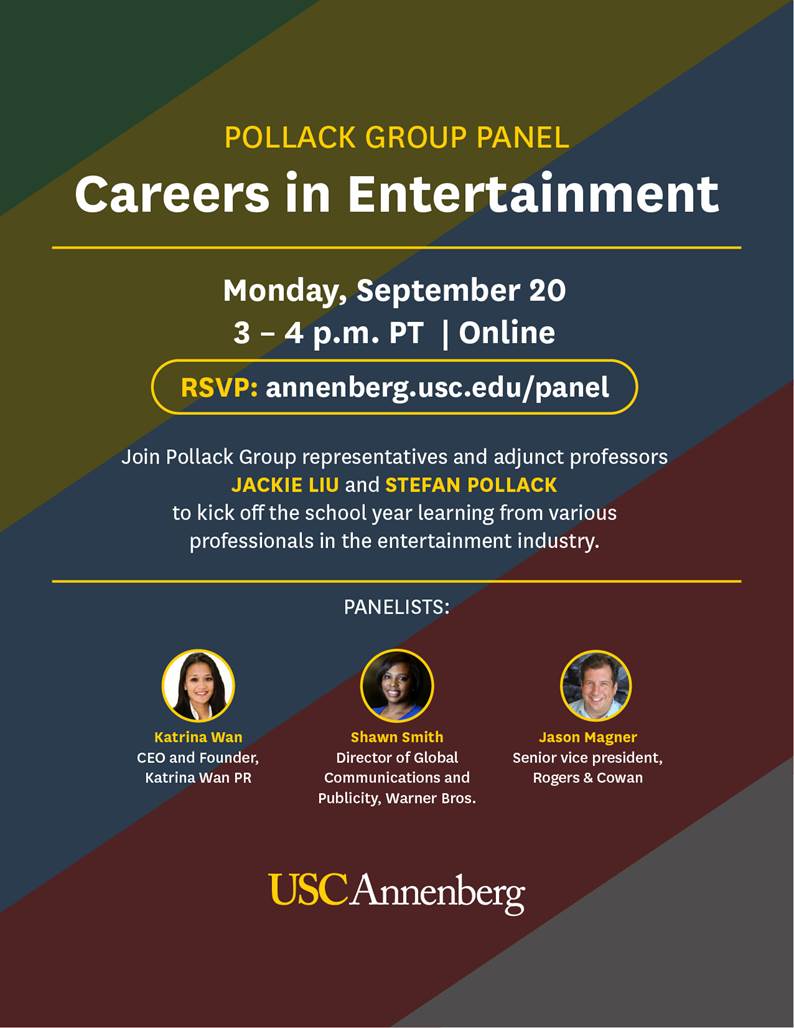By Alyssa Siegel
The entertainment industry is synonymous with packed production sets, bustling editing rooms, and star-studded red-carpet premieres. However, in the face of the current global pandemic, the industry has seen an upheaval of norms. Changes arising from technological innovations and shifts in practices have left students and young professionals with unease and questions such as, “how do you land your first internship” and “what are the most effective ways to network in a digitized world?”
In a career panel hosted by The Pollack Group representatives President Stefan Pollack and Vice President Jackie Liu, in partnership with the USC Annenberg School for Communication and Journalism, as well as top professionals in the entertainment industry. All shared their insights. Panelists included Katrina Wan, CEO and founder of Katrina Wan PR; Shawn Smith, director of global communications and publicity at Warner Brothers; and Jason Magner, senior vice president at Rogers & Cowan stPMK. Check out the panelists’ notable and thought-provoking takeaways about the entertainment industry and hiring in “the new normal.”
Click here to view the full panel.

Impact of COVID-19 on the entertainment industry
In light of the pandemic, the panelists shared examples of what they saw to be positive changes. “It definitely has changed things, especially in a business where networking is paramount to success,” Magner said. He noted that the switch to video conferencing has accelerated meeting efficiency.
Smith reflected on Warner Brothers’ innovative experiential marketing initiatives. “Our incredible marketing team last year came up with the idea to host the first-ever global virtual fan experience,” she said. “It really challenged our team to come up with other ways to talk to our fans and share content.” Wan added that film PR pivoted quickly and successfully to virtual events like drive-thru screenings, finding new ways to reach audiences. She added that she believes Zoom will continue to be an important tool for press junkets and global interviews.
Advice for applicants in a competitive marketplace
Speaking to students and young professionals who are beginning their job search, the panelists identified qualifications they seek in top candidates. As expected, great writing and other fundamental skills are still a priority. “It is certainly super important from an education standpoint to have those basic building blocks coming into an agency,” Magner said, adding that the ability to network is also crucial.
“Be a strong writer, a strategic thinker and creative,” Smith added. She also advised applicants to research the vast opportunities studios offer beyond publicity.
According to Wan, reputation can be a key differentiator in the hiring process. “Your recommendation is what is going to get you through the door,” she said. “The people vouching for you are the people who are going to take you all the way to the top.” In addition, sharing a unique point of view can help candidates stand out. “Ninety percent of people who walk in say ‘I’m passionate about entertainment,’” Wan added. “Be very specific and tailor it to that job so they know you’re serious.”
On the topic of cover letters, the panelists generally agreed that they are less important today than before. Incorporating keywords relevant to the job description can aid with preliminary computer screening, but the general sentiment from the panel was that cover letters alone will not secure a position.
Innovation and new opportunities
In the wake of new social media platforms, unique job opportunities are emerging. “There’s always something new, so it is helpful for you to know what those platforms are and how they can be a part of a PR marketing campaign because that is becoming more integrated now,” Smith said. She also encouraged job seekers to look at social media platforms from a business perspective, noting how she loves to study what other brands and competitors are doing, and observe how they leverage their influence.
Magner highlighted the use of AR and VR technologies to meet the increasing demand to produce remotely. In addition, evaluating the viability of NFTs and cryptocurrency, could create opportunities to finance productions in the future. Creating unique at-home viewing experiences outside of computers or traditional flat-screens, is also under consideration, he noted.
For international students and young professionals seeking job opportunities, the panelists identified the need for globalized workers. “We are getting a lot of opportunities now for international media conglomerates,” Magner said.
“For Warner Brothers, we are a global entertainment company so that’s actually really valuable,” Smith said. “If I had someone on my team that was bilingual or multilingual, that would be a big benefit to me.”
Networking in the new normal
For students starting out in the entertainment industry without contacts, the panelists offered networking advice. “I want to give a shoutout to professional organizations,” Smith said, noting their usefulness for those hoping to break into the industry. She also emphasized the importance of cultivating and maintaining authentic connections with new contacts. “Be kind to people because you are going to come across those same people in some way, shape or form,” she said.
Whereas working and networking in the PR industry before typically meant placing a lot of phone calls, social media and email are now our preferred primary communication tools. Wan reiterated Smith’s emphasis on creating authentic connections with people considering increasingly digitized, and impersonal, networking.
“In terms of connections, 90% of this is showing up and being present and eager,” Pollack said. “It’s so important to make relevant connections that are meaningful and that you can take as reference points. It’s all about the entry point and who referred you in.”






